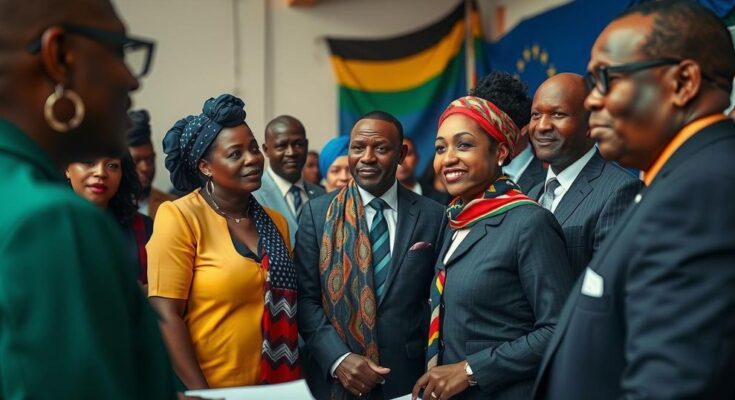Namibia is set to vote in a presidential election on November 27, 2024, where Netumbo Nandi-Ndaitwah, the vice president and SWAPO candidate, stands as a strong contender for the role of the first female leader in the nation. Amid rising public frustration over economic issues and high unemployment, Nandi-Ndaitwah has proposed ambitious job creation plans. The election’s results could reflect broader regional political trends as well as the changing dynamics within Namibia.
Namibia is conducting a pivotal presidential election on November 27, 2024, where a significant milestone may be achieved if Netumbo Nandi-Ndaitwah, the current vice president and a candidate from the ruling South West Africa People’s Organization (SWAPO), emerges victorious. This election has garnered considerable attention as Nandi-Ndaitwah, a veteran of the country’s independence movement, is poised to potentially become Africa’s first female head of state. Despite leading early voting results, her party faces increasing public dissatisfaction stemming from high unemployment and economic struggles, particularly among the youth, which may impact the election’s outcome.
In response to these challenges, Nandi-Ndaitwah has pledged to address unemployment, vowing to allocate around 85 billion Namibian dollars (approximately $4.7 billion) aimed at generating over 500,000 jobs in the next five years. However, critics question the feasibility of this ambitious plan amid SWAPO’s declining popularity, following its lowest electoral share in the previous vote in 2019. A total of 14 candidates are contesting for the presidency, and if none achieves a majority, a runoff will occur, a process not previously experienced in Namibia’s electoral history.
History plays a critical role in this election, as SWAPO has governed Namibia since its independence from South Africa in 1990. Recent political events in neighboring countries illustrate a regional trend of electoral shifts, which could foreshadow a similar outcome in Namibia. Thus, the elections hold great significance not only for the country’s political future but also for advancing gender representation in leadership roles across Africa.
Namibia, having gained independence from apartheid South Africa in 1990, has been predominantly governed by the SWAPO party. The current political landscape is marked by economic challenges, particularly high youth unemployment, which has stoked public dissatisfaction and led to questions regarding the effectiveness of the ruling party. The election of November 27, 2024, presents a critical moment, as it not only involves choosing a new leader following the death of President Hage Geingob but also offers the potential for the first female president in the region through Nandi-Ndaitwah’s candidacy. As Namibia prepares to cast ballots, observers are attuned to regional electoral dynamics, which have influenced recent political upheavals in adjacent countries.
The upcoming presidential election in Namibia represents a crucial intersection of potential historical change and contemporary challenges. With Netumbo Nandi-Ndaitwah aiming to become the first female leader in the country’s history, the election underscores the importance of gender representation in leadership. The broader socio-economic issues, particularly unemployment, alongside shifting public sentiment towards the SWAPO party, could significantly impact the election’s outcome and shape Namibia’s political future in the coming years.
Original Source: apnews.com




